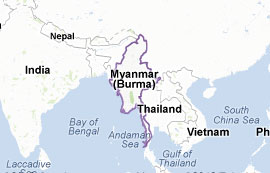BANGKOK—Myanmar’s military, long criticized for human rights abuses, may be invited as an observer at annual US-Thai joint military exercise next year, officials in Washington and Bangkok said Friday.
The potential invitation to the Cobra Gold exercise would come after years of Myanmar being frozen out of US regional activities because of Washington’s disapproval of the former military regime’s repression. Thailand-based Cobra Gold is the biggest and longest-standing US military exercise in the Asia-Pacific region.
With reforms taken under the elected government that took power in Myanmar last year, relations have turned around, though Washington has proceeded with caution for fears of backsliding by Myanmar President Thein Sein’s government.
Myanmar may be invited for the exercise, which normally takes place at the beginning of each year, but there has been no final decision, Pentagon press secretary George Little said in Washington. He added that it is Thailand that sends out the invitations in consultation with the US.
“The United States is open to considering a request from the Kingdom of Thailand to have a small contingent of Burmese military officers attend Cobra Gold as observers to observe the humanitarian assistance and disaster relief and medical, medicine portion of the exercise as long as it is consistent with US efforts to advance protection of human rights, civilian rule of the military, anti-corruption efforts and other reform issues,” Little said.
The United States calls Myanmar by its old name, Burma, which was changed by the previous ruling junta there.
Any observer contingent from Myanmar would be limited to three officers, Pentagon spokeswoman Maj. Cathy Wilkinson said.
Thai Defense Ministry spokesman Thanathip Sawangsaeng said in Bangkok that there are tentative plans to invite Myanmar, but participating countries must agree on the action at a meeting late this month. He said Thailand had not been lobbying for Myanmar’s inclusion.
“We would need a consensus from all participating countries. However, the move to include Myanmar in the exercise could be seen as an attempt to expand military readiness in the region,” he said.
A US Embassy spokesman declined to comment, and US Ambassador to Myanmar Derek Mitchell said at a news conference in Yangon that he did not have any information on the matter.
Myanmar has been slowly shedding its status as a pariah state now that the army-backed but elected government that took power last year has instituted political and economic liberalization. The reforms follow almost five decades of repressive military rule.
Pentagon spokesman Little said there is a larger U.S. government effort to talk with the Myanmar government, including a recent State Department-led visit there that included some Defense Department personnel that focused primarily on human rights.
“We’re exploring opportunities to discuss a range of issues with the government of Burma,” Little said.
Myanmar’s moves toward political reconciliation with democracy movement leader Aung San Suu Kyi won it the easing of sanctions imposed by the West. Participation in the Cobra Gold would be a further sign of improvement of relations with the US in particular.
However, many critics of military rule point out the army’s continued power and influence in the current government, which is guaranteed by the constitution it helped draft. They are cautious about moves that could strengthen the military.
Maung Zarni, a Myanmar scholar who is a visiting fellow at the London School of Economics, described Washington’s possible invitation to Myanmar as “utterly premature, ill-informed and too self-interested.”
He said continued abuses include recent reported large-scale violence the army employed against the Muslim Rohingya minority during riots in western Myanmar and in its continuing battles against the Kachin minority in the north.
“Empirically and historically, the military-to-military ties that the Pentagon build around the world are not known for producing democracy, human rights or reform dividends, particularly for peoples of countries under dodgy governments,” Maung Zarni said in an email to The Associated Press. “Within Southeast Asia, Suharto’s Indonesia, Marcos’ Philippines and Ne Win’s Burma spring to mind.”
The Cobra Gold exercise held earlier this year included members of the Indonesian, Japanese, Malaysian, Singaporean and South Korean militaries, more than 10,000 in all. Other regional countries were invited as observers.
Cobra Gold began in the early 1980s, soon after Vietnamese troops pushed to the Thai border after invading Cambodia to oust the Khmer Rouge regime. Early exercises concentrated on conventional military tactics and strategies for attack and defense.
In recent years, the exercise has concentrated on peace-keeping operations and humanitarian and civic assistance projects.
When a deadly cyclone hit Myanmar in 2008, US Navy ships were diverted from Cobra Gold to offer assistance. But the military government then in power declined their help, apparently suspicious of US intentions.
